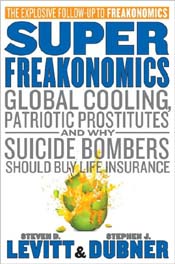For my big road trip home last weekend, I picked out Steven Levitt and Stephen J. Dubner’s book SuperFreakonomics as an audio book for my car ride. When I grabbed it at the library, I was pretty skeptical about whether it would be any good, but within just an hour of listening I felt like most of my initial concerns were allayed pretty convincingly.
In fact, all of my notes on the book start out something like, “This was more funny than I expected!” or “Wow, economics is more understandable than I thought it would be!” The entire listening experience felt like I was constantly reassuring the Skeptical Reader in my head that the book was going to be good.
If I, a healthy lover of nonfiction, had so many questions about the book, I thought other readers might too. Hence, a Q&A about SuperFreakonomics between a Skeptical Reader and myself.
Skeptical Reader: Is it necessary to read Freakonomics before taking on SuperFreakonomics?
Kim: I don’t think so, but it’s hard for me to say. SuperFreakonomics does make a number of passing references to the first book, along the lines of, “Remember the cheating sumo wrestlers?” but I don’t think they’re such important references it makes reading the first book a necessity. Boyfriend and I did recently watched the documentary version of Freakonomics on Netflix, so I knew vaguely what they were talking about. If you’re concerned but short on time, check out the documentary, otherwise I think you can dive right in.
Skeptical Reader: I don’t know anything about economics. Is this book going to be too hard for me?
Kim: Absolutely not. In fact, I think this book is probably most enjoyable for people without much of a background in economics or who don’t know much about how economic research works precisely because Dubner and Levitt work so hard to use as little jargon as possible. And when they do use jargon, it’s often with a memorable example — pimps and prostitutes or capitalist monkeys — that makes the definition stick in a workable way.
In fact, I think my favorite part about this book is the fact that Dubner and Levitt were able to expand my idea of what economics research can cover. As they explain it, economics is not just about money and the economy — it’s a different way of looking at an issue and defining a problem. The book is an exercise in economic thinking, re-framing complicated issues into questions of incentives and statistics. It’s a different way of looking at the world, and one they make a good case for supporting.
[continue reading…]







 Monday Tally is a weekly link round-up of some of my favorite posts discovered over the week. If you have suggestions for Monday Tally, please e-mail sophisticated [dot] dorkiness [at] gmail [dot] com. Enjoy!
Monday Tally is a weekly link round-up of some of my favorite posts discovered over the week. If you have suggestions for Monday Tally, please e-mail sophisticated [dot] dorkiness [at] gmail [dot] com. Enjoy!

 Earlier this year I posted quite a bit about my involvement with the
Earlier this year I posted quite a bit about my involvement with the